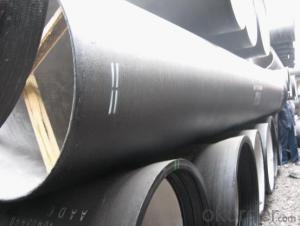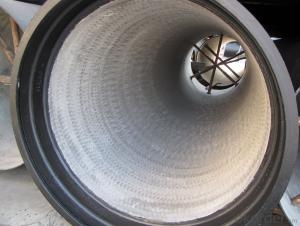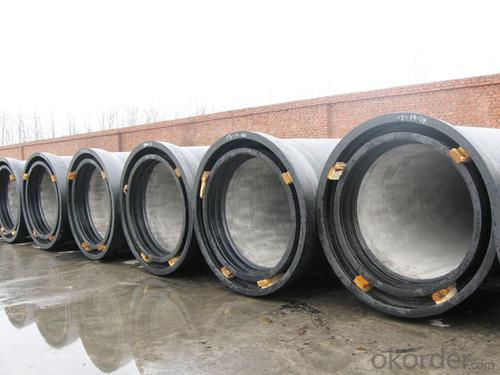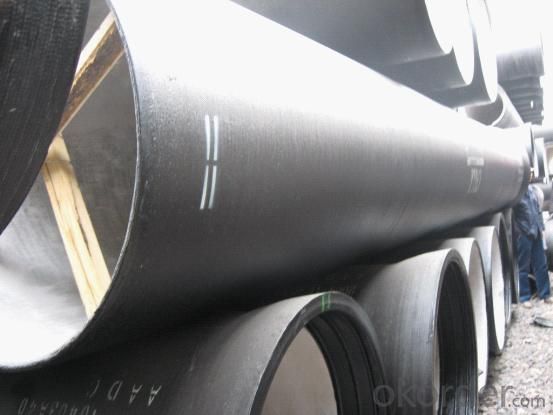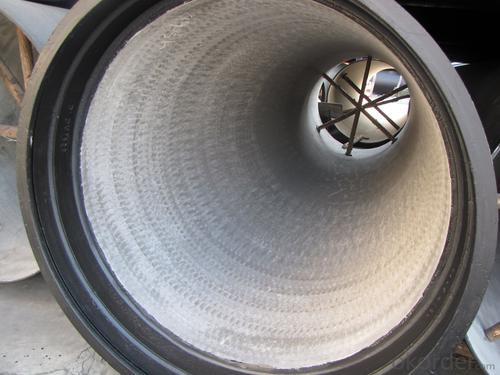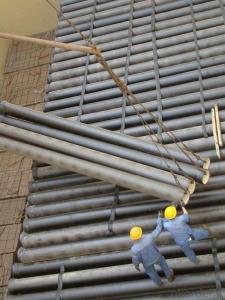Ductile Iron Pipe DN150 DN300 K8 K9 K7 C
OKorder Service Pledge
Quality Product, Order Online Tracking, Timely Delivery
OKorder Financial Service
Credit Rating, Credit Services, Credit Purchasing
You Might Also Like
Specifications
Quick Details
| Place of Origin: | China (Mainland) | Brand Name: | CMAX | Model Number: | T type / K type / Flange type |
| Length: | 6m / 5.7m / Negotiable | Standard: | ISO2531 / EN545 / EN598 | Application: | Potable / Sewage water |
| Diameter: | DN80~DN2200 | Shape: | Round | Hardness: | 230 |
| Pipe Wall Thickness: | standard | Pull Strength: | 420 | Yield (≥ MPa): | 300 |
| Material: | Ductile Iron | Type: | Centrifugal ductile cast iron pipe | Certification: | ISO2531 / EN545 / EN598 |
| Outer Diameter: | 80-2200 | Thickness: | standard | Specification: | DN80~DN2200 |
| |
The advantages to the customer:
Trustworthy financial strength.
One-stop shopping.
Fast and efficient service.
Coordination of shipments from multiple plants.
Specialists of the overseas shipping process.
A more competitive price.
- Q: What's the difference between grey cast iron pipe and ductile iron pipe?
- Spheroidal graphite cast iron and ordinary cast iron contain graphite monomer, that is to say, cast iron is a mixture of iron and graphite. The graphite in ordinary cast iron is flaky, and the strength of graphite is very low, so there are many flakes of voids in the cast iron, so the strength of ordinary cast iron is lower and more brittle. Graphite in graphite cast iron is spherical, equivalent to the existence of many spherical voids in cast iron. The effect of spherical voids on the strength of cast iron is much smaller than that of sheet voids, so the strength of nodular cast iron is much higher than that of ordinary cast iron.
- Q: Can ductile iron pipes be made into clear tubes?
- Of course, you can also use as a pipe, but because of the appearance of cast iron pipe is not very beautiful, but relatively brittle, by external impact or bad insulation cold winter break, so according to your use of the environment to determine.
- Q: Can ductile iron pipes be used for hydropower projects?
- Yes, ductile iron pipes can be used for hydropower projects. Ductile iron pipes are known for their durability, strength, and resistance to corrosion, which makes them suitable for various applications, including hydropower projects. They can handle high-pressure water flow, making them ideal for conveying water to turbines or other power generation equipment. Additionally, ductile iron pipes have a long lifespan, which reduces maintenance and replacement costs over time. Therefore, using ductile iron pipes in hydropower projects can contribute to the overall efficiency and reliability of the system.
- Q: Which is better, ductile iron pipe and spray plastic pipe?
- Ductile iron pipe corrosion resistance, strength, it is said that the Ming Dynasty ordinary cast iron works now, and now has a new type of dedicated, can be used, construction becomes very convenient, ductile iron pipe has no effect on water quality. Plastic sprayed steel pipe is a new type of pipeline with higher price.
- Q: Can the underground cast iron pipes be connected with clamps to form buttress?
- The clamp hoop is a connecting device for connecting pipe fittings, valves and pipe fittings with grooves. Used in the fast joint between the role of tightening, the general two joints with gaskets, rubber, and silicone, ptfe.
- Q: Comparison of ductile iron pipe and spiral steel pipe
- Ball milling cast iron pipe: corrosion resistance, high compressive strength, cheap, non pressure, socket connection.
- Q: Can ductile iron pipes be used in gravity sewer systems?
- Yes, ductile iron pipes can be used in gravity sewer systems. Ductile iron is a strong and durable material that is commonly used in various applications, including sewer systems. It has excellent resistance to corrosion and can withstand high pressure and heavy loads. Additionally, ductile iron pipes have a smooth interior surface, which helps to reduce friction and improve the flow of waste and wastewater. Therefore, they are a suitable choice for gravity sewer systems, where the flow of sewage relies on gravity to move through the pipes.
- Q: A tube is used only in ductile iron pipes, isn't it?
- Compared with the PE pipe, from the installation time, ductile pipe PE pipe installation is simple and rapid, and after the installation of internal and external pressure bearing better tightness and corrosion resistance; from the point of view, ductile pipe sealing better after installation, but also can improve the corrosion resistance of corrosion protection through a variety of means; from the hydraulic performance, because ductile pipe specifications generally refers to the inner diameter of PE pipe diameter specifications generally refers to the same specifications, because under the condition of ductile pipe can achieve greater runoff; from the installation and maintenance cost, ductile pipe have more favorable price. The main components of ductile iron pipes are carbon, silicon, manganese, sulfur, phosphorus and magnesium. The inner wall of zinc spray, anti-corrosion materials such as cement mortar.
- Q: What is the expected deflection limit of ductile iron pipes?
- The expected deflection limit of ductile iron pipes is typically around 2% of the pipe's diameter, as per industry standards.
- Q: Do ductile iron pipes have inner enamel?
- Internal enamel ductile iron pipe is yes, but now there is almost no market (except for special process requirements), in the civil construction market, new materials, new technologies, new technologies can be replaced, there are many.
Send your message to us
Ductile Iron Pipe DN150 DN300 K8 K9 K7 C
OKorder Service Pledge
Quality Product, Order Online Tracking, Timely Delivery
OKorder Financial Service
Credit Rating, Credit Services, Credit Purchasing
Similar products
Hot products
Hot Searches
Related keywords

